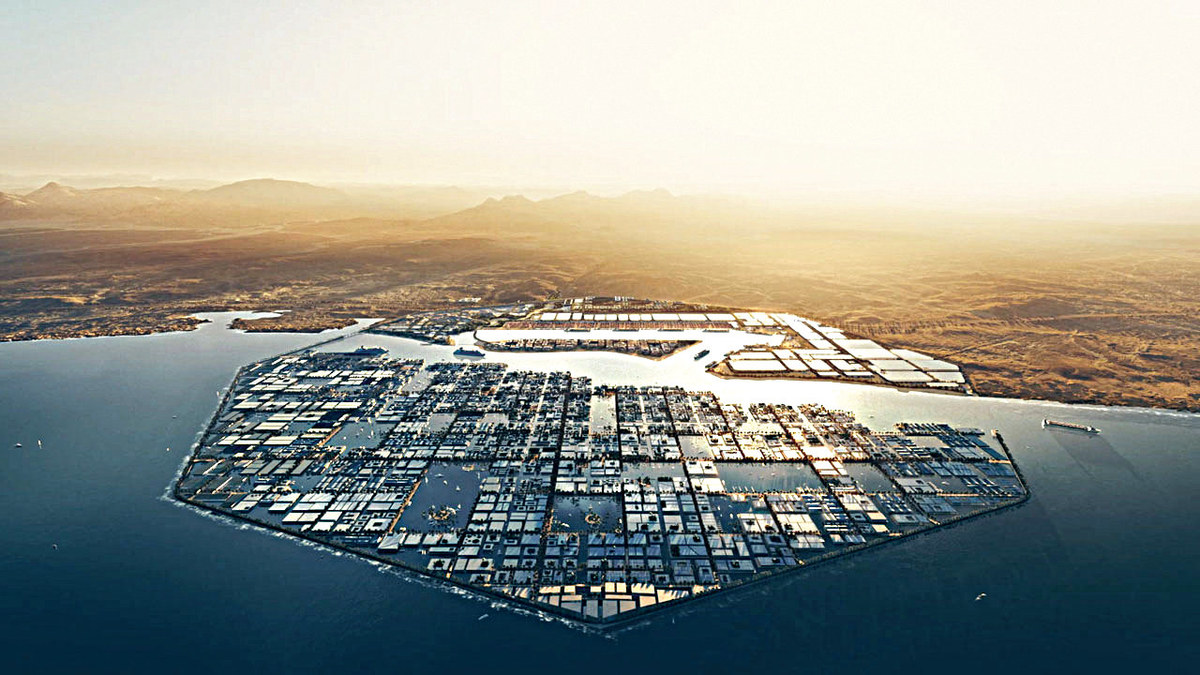RIYADH: Brett Smythe has a big and challenging task ahead of him. Smythe, who is the chief projects officer of NEOM, has been commissioned along with his team to turn the ambitious dream of Saudi Crown Prince Mohammed bin Salman of a $500 billion futuristic megacity into a reality.
And he is exactly doing that.
“When Saudi Arabia’s visionary NEOM project was announced by Crown Prince Mohammed bin Salman in 2017, it caught the attention of the world with its ambition and scale — an attempt to achieve something that has never been achieved before, redefining livability, business and conservation. A cornerstone of Vision 2030 that is driving economic diversification in the Kingdom,” Smythe told Arab News in an exclusive interview.
Since then, NEOM’s strategy has grown up, with significant developments underway.

Brett Smythe, NEOM chief projects officer. (Supplied)
All regions of NEOM will be built simultaneously, in keeping with the project’s mission to accelerate and deliver progress, according to him.
Smythe gave thorough explanations on the progress of the project.
“Work has also commenced on The Line, a series of communities built along a 170-km strip of land from the Red Sea deep into the interior of Saudi Arabia, integrated with The Spine, the transport and logistics backbone that will service The Line. Early grading work has already commenced, and major contracts are progressing for The Spine infrastructure to Bechtel (executive project manager), AECOM (lead designer) and China Railway Construction Corp. (adits and portals),” Smythe noted.
Work has started on OXAGON, a radical new model for future manufacturing centers, as well as the civil engineering and infrastructure for its water innovation hub.
“Construction has made important headway on NEOM’s road and utility backbone, its first permanent villages, marine works and social infrastructure,” Smythe said.
He also pointed to the world’s largest volumetric mass modular manufacturing facility in NEOM is also being established, and additional work is commencing on major energy, water and transport assets, hospitality venues, airport upgrades, island tourism destinations and a marina.
Smythe promised that 2023 will see a speed up of large-scale permanent construction in all areas. Across its 26,500 square kilometers, covering both land and maritime regions, the above scale of development still only accounts for 5 percent of NEOM in total — maintaining the project’s conservation goals and promise to shape a future in harmony with nature.
He proudly indicated that the scale of the work on this project has never been witnessed before.
“We’re building something on a scale never seen before, using new technologies to bring to life one of the world’s most exciting and disruptive projects. As NEOM progresses through the construction of the project, it will create the most advanced economic construction ecosystem in the world, which will go on to contribute to the long-term gross domestic product of NEOM, Saudi Arabia and beyond,” Smythe said.
HIGHLIGHTS
All regions of NEOM will be built simultaneously, in keeping with the project’s mission to accelerate and deliver progress.
Construction has made important headway on NEOM’s road and utility backbone, its first permanent villages, marine works and social infrastructure.
There are currently over 11,000 workers from 44 contractors on site.
New perspective
Smythe and his team are putting the final touches on the construction of essential support infrastructure.
“We are finalizing the construction of the essential support infrastructure including logistics parks, roads and utilities. Massive scale permanent work is ramping up, and it will go on for the rest of this decade,” he said.
The teams had a robust pipeline of work and schedules set for the next 18 months.
“Our master plans have developed considerably, so much so that we are significantly opening up our permanent works. We are open for business, and hosted 300 design and construction leaders in NEOM who were given a detailed overview of how the project’s vision is coming to life.”
There are currently over 11,000 workers from 44 contractors on site; over 8,000 pieces of plant and heavy equipment and over 34 million job hours completed to date.
Permanent facility works have already commenced in OXAGON, as well as the NEOM Logistics Park. The 12-square-km park includes new construction villages that will support the initial communities of 30,000, expanding to well over 150,000 within the next two years, and will specifically cater to construction requirements.
Additionally, the logistics park will include manufacturing and distribution hubs servicing long-term construction, along with 30 initial concrete and asphalt batching plants, and waste segregation and recycling areas. This infrastructure will complement and enable the latest in offsite manufacturing, design and construction automation.
Smythe stressed that Saudi Arabia is on the verge of the biggest construction boom in the world.
“It is essential to take advantage of this development to benefit NEOM and the whole Kingdom. We will work with our partners to create a design and construction economy, including the full value chain to act as a construction hub for companies in NEOM and Saudi Arabia,” he added.
Smythe said the construction ecosystem of NEOM is being pioneered to meet the challenges of the project’s scale and pace.
“We are committed to positively disrupting the way projects are conceived, planned and delivered. NEOM will serve as a living laboratory for research and development into design and construction processes and materials. In fact, the full development process, from planning, to design, construction and operations, will be enabled by advanced technologies designed to increase efficiency and sustainability, creating the largest modern methods of construction (MMC) ecosystem in the world and leveraging best practice with worker welfare.”
Pillars of the project
To build at the required pace, a significant proportion of the work will be moved offsite to be prefabricated in factories. The application of MMC for both infrastructure and buildings, integrated with innovations including 3D printing, autonomous vehicles, new materials and structural forms, will drive benefits in speed, cost, quality, health and safety, and sustainability. Additionally, the development of these capabilities will establish NEOM as a global center of best practice for construction innovation, creating new businesses and skilled jobs.
In his view, better planning, design and execution, using MMC and supported by a variety of digital tools together with recycling, will allow NEOM to send zero construction waste to landfill, use fewer natural resources and reduce emissions from both construction and operations when compared to traditional buildings and infrastructure. This has significant sustainability benefits.
Circular economy techniques will also be enormously important for NEOM.
“Our focus within our master planning process is the designing of buildings and communities for both their intended use, and for their next life; details of the materials used will be recorded so we can plan for their next life.”
Smythe’s team is committed to significantly reducing embodied carbon, and using sheer scale, and to work with industry to reduce emissions from concrete, one of the largest sources of CO2 in construction.

Work has started on OXAGON, a radical new model for future manufacturing centers. (Photo courtesy of NEOM website)
Sustainability
NEOM’s long-term ambition is to be able to deliver net-carbon-zero communities in the future, and the starting point is how we build.
“To achieve this, we are exploring alternative structural forms and building materials, and collaborating with the entire supply chain, including the cement manufacturers and vehicle suppliers, to minimize the carbon footprint of our construction activities,” Smythe said.
NEOM is looking at significant pilot projects that adopt the use of materials and structures that will reduce concrete demand by over 30 percent and will phase in tools, techniques and powertrain shifts over time to develop viable large-scale zero-emission construction equipment and vehicles to reduce emissions even further. Longer term, NEOM will be installing renewable energy grid across NEOM’s construction sites.
According to the CFO, Digital technologies will play a fundamental leading role during NEOM’s planning, design and procurement processes, through construction, and critically, over the lifetime of operations and management.
NEOM will tap into its core digital backbone right from the start of the design phase and into construction; Singapore is the only place in the world that has anything comparable, and it was initiated recently and retroactively.
By digitalizing all its systems from the start of development, NEOM will be able to optimize all of its processes within the life cycle of design and construction.
AI, machine learning
The development team is exploring the integration of virtual supply chain platforms, the future of procurement and dealing with suppliers linked to the digital backbone.
“This will be further enhanced through the use of AI and machine learning to constantly improve efficiencies, reduce work hours and enable construction at speed while driving improvements in both quality and sustainability. In short, we will be deploying advanced MMC using sustainable and digital technologies and through this, we will be supporting both the Kingdom’s and the global construction industry’s journey to a new paradigm,” Smythe said.
Investing in humanity
The team is building a new region and with it comes obligations to change the role of workers in construction.
The purpose is to create an industry defined by high skills, automation, factory working and one where the traditional risks are no longer tolerated.
This will be a significant change program, and it is one that underpins NEOM’s overarching approach to health and welfare, to training and to engagement, according to Smythe.
“Technology is a key enabler, but much more than that, we seek to significantly increase the value of a person-hour in our industry. We are taking a different approach to how we design our accommodation, to training, to the working environment and ultimately to integration in society. This will continue to underpin every decision that we make,” he concluded.






















